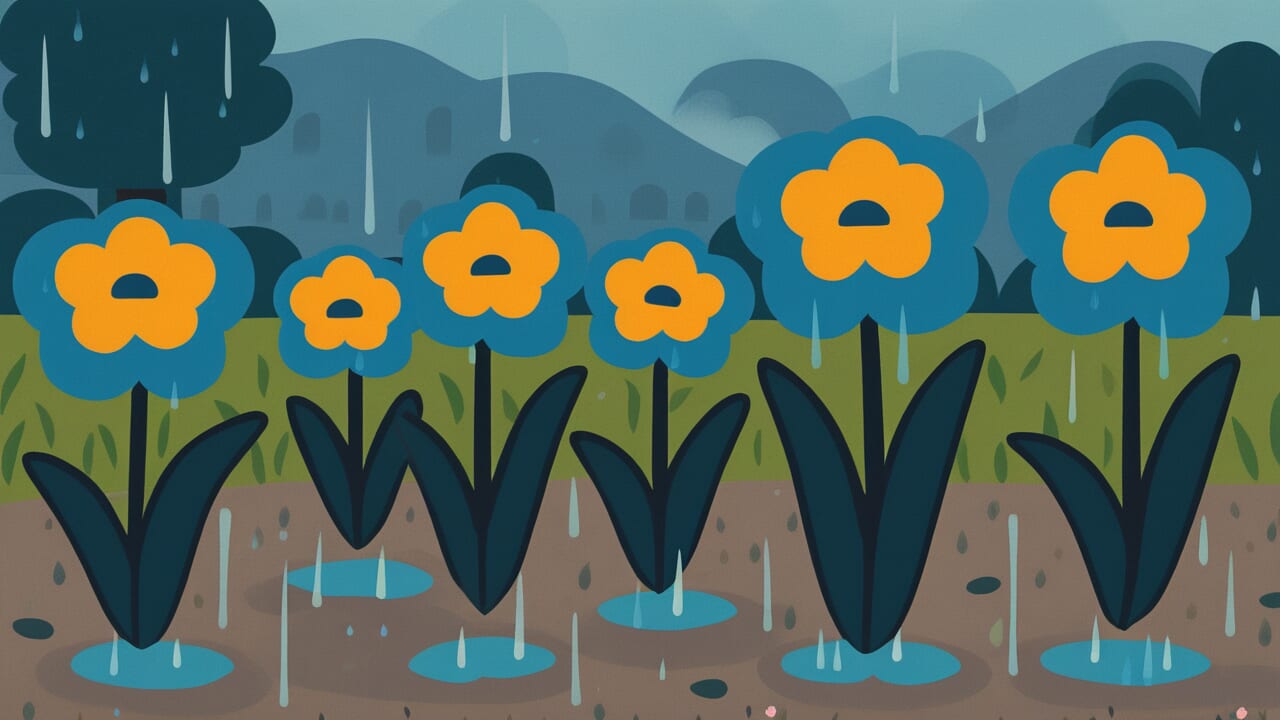How to Read “Rain is the father and mother of flowers”
Ame wa hana no fubo
Meaning of “Rain is the father and mother of flowers”
“Rain is the father and mother of flowers” is a proverb that shows how rain is an essential blessing for flowers to grow. Just as parents raise their children, rain nurtures flowers and helps them bloom beautifully.
This proverb teaches us that behind visible beauty and results, there are invisible blessings that support them. When we admire the beauty of flowers, we often forget about the rain that nurtured them. But in reality, no flower can bloom without the nourishment that rain provides.
Today, people use this saying when something succeeds or produces beautiful results, reminding us to appreciate the support and blessings behind it. It’s also used to express the importance of humble, unnoticed but essential contributions.
This phrase contains deep insight. It helps us recognize the importance not just of brilliant achievements, but of the foundation and environment that nurtured them.
Origin and Etymology
There doesn’t seem to be a definite record of when this proverb first appeared in literature. However, we can understand how it came to be by looking at how the phrase is constructed.
Let’s focus on the expression “father and mother.” In traditional Japanese values, parents are considered the most precious beings who raise, protect, and help their children grow. This proverb compares the relationship between rain and flowers to exactly this parent-child relationship.
In Japan, which has been built on agricultural culture, rain has always held special meaning. Rain that moistens fields and grows crops was the very blessing that supported people’s lives. At the same time, the culture of appreciating flowers has deep roots, with seasonal flowers like plum blossoms, cherry blossoms, and chrysanthemums enriching people’s hearts.
When these two elements came together, the expression “Rain is the father and mother of flowers” was born. No matter how beautiful a flower is, it cannot bloom without the blessing of rain.
This relationship was compared to the deepest bond of love and nurturing between parents and children. Through observing nature’s laws, our ancestors felt the greatness of rain’s blessing and created this proverb to express it simply.
Usage Examples
- This project succeeded thanks to the staff who supported us behind the scenes—truly, rain is the father and mother of flowers
- Watching children grow, I realize how important daily small interactions with parents are—I truly feel the meaning of rain is the father and mother of flowers
Universal Wisdom
The proverb “Rain is the father and mother of flowers” reflects a universal truth in human society. Behind visible achievements, there is always invisible support.
We tend to be captivated by brilliant results. Cherry blossoms in full bloom, victorious athletes, successful businesses. But behind that brilliance, there is always steady accumulation and someone’s devoted support.
Without rain, flowers cannot bloom. Our ancestors saw this simple law of nature as the essence of human society.
Thinking more deeply, this proverb teaches us about the “chain of blessings” that is a truth of life. We ourselves are rain for someone, and at the same time, we are flowers nurtured by someone’s rain.
No human can exist completely independently. We are supported in unseen ways, and we support others in unseen ways. This interdependence is the foundation that makes human society work.
This proverb has been passed down for so long because humans instinctively have the weakness of easily forgetting what they should be grateful for. That’s why our ancestors left us these words, trying to remind us.
Don’t forget gratitude for invisible blessings. That is the eternal challenge for maturing as a human being.
When AI Hears This
A single raindrop weighs about 0.05 grams, but when this tiny amount of water seeps into the soil, flowers can absorb nutrients thousands of times their own weight. This is a classic example of what systems thinking calls a “leverage point.”
In other words, within a system’s structure, there are places where a small intervention triggers massive change.
What’s noteworthy is that rain doesn’t directly provide nutrition to flowers. Rain activates microorganisms in the soil, changes osmotic pressure in roots, and regulates the opening and closing of stomata needed for photosynthesis.
One element simultaneously triggers multiple chain reactions. Systems theory researcher Donella Meadows identified twelve points for changing systems, noting that the most effective isn’t “changing parameters” but “changing information flow.”
Rain sends water as a signal to the information network called soil, rebooting the entire system.
The same structure appears in companies. Rather than executives investing huge budgets, simply changing how employees share information can double productivity. In education, rather than teachers giving long lectures, just creating an environment where students can easily ask questions dramatically improves learning outcomes.
Like rain, small interventions that identify a system’s vital points are the design philosophy that produces maximum results.
Lessons for Today
What this proverb teaches us today is the importance of having a perspective of gratitude. If you accomplished something today, was it really your power alone? Surely, someone supported you.
Modern society tends to emphasize individual achievement. But in reality, we live supported by countless “rains.” Safe tap water, maintained roads, teachers who taught us, friends who encouraged us. All of these are rain that helps you as a flower bloom.
And don’t forget that you yourself can be rain for someone. Your casual words or actions might be supporting someone’s growth. Even if it’s not flashy, even if it’s humble, it’s definitely bringing blessings to someone’s life.
In your daily life, pause and think for a moment. What “rain” supported you today? And for whom were you able to be “rain”?
Such questions will make your life richer and filled with gratitude.



Comments